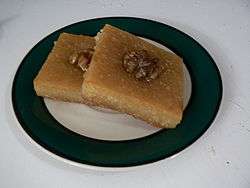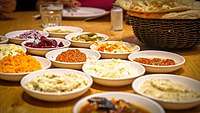Basbousa
Basbousa (also namoura, revani, hareseh and other names) is a traditional Middle Eastern sweet cake that originated in Egypt, though also popular in other countries. It is made from a semolina batter in a pan,[2] sweetened with orange flower water, rose water or simple syrup, and typically cut into diamond shapes. It is found in most former areas of the Ottoman Empire,[3] and is featured in Middle Eastern cuisines, Greek cuisine, Azerbaijani cuisine, Turkish cuisine, and many others.
 Basbousa topped with walnuts | |
| Alternative names | Basbuusa, Basbousa[1] |
|---|---|
| Type | Dessert |
| Region or state | Egypt, Middle East, Balkans, North Africa, the Caucasus |
| Serving temperature | Cold or warm |
| Main ingredients | Semolina or farina, syrup, yogurt |
| Variations | Orange blossom syrup or rose |
| Calorie rich kcal | |
Names
It is found in the cuisines of the Middle East, the Balkans and the North Africa under a variety of names.
- Egyptian Arabic: basbūsah
- Arabic: هريسة harīsa (meaning mashed or crushed), نمورة nammoura
- Armenian: Շամալի shamali
- Greek: σάμαλι (samali).
- Turkish: revani
Basbousa is the dessert's Egyptian name and it is called the same in North Africa. It's often called "hareesa" in the Levant, and also the Egyptian city of Alexandria, though in other parts of Egypt hareesa is a different type of dessert. Also note that "haressa" in North Africa is a spicy red sauce. Basbousa is a popular dessert among all Egyptians, it's a main Egyptian dish at Eids and Ramadan tables, also for Christians in their fasts, such as the Great Lent and Nativity, as it can be made vegan.
Variations
Pastūsha (sometimes stylized as pastūçha) is a variant of basbousa that originated in Kuwait in the 2010s. Like basbousa, it is made from semolina soaked in sweet syrup. It is characterized by the addition of finely ground pistachios and orange flower water.
Basbousa bil ashta - a Levantine variation of basbousa filled with ashta cream in the middle.
See also
References
- "Καλόν πράμαν ή σιάμαλι". foodmuseum.cs.ucy.ac.cy (in Greek). Cyprus Food Virtual Museum. Retrieved 26 November 2015.
- "Arabic Dessert".
- Marks, Gil (17 November 2010). Encyclopedia of Jewish Food. HMH. ISBN 978-0-544-18631-6 – via Google Books.
Works cited
- Davidson, Alan (2014). Oxford companion to food. [S.l.]: Oxford University Press. ISBN 978-0199677337.
Հայկական խոհանոց | |||||||||||||
| Ingredients |
| ||||||||||||
| Breads | |||||||||||||
| Soups | |||||||||||||
| Appetizers and salads | |||||||||||||
| Main entrées |
| ||||||||||||
| Grilled meats | |||||||||||||
| Beverages |
| ||||||||||||
| Desserts | |||||||||||||
| Instruments | |||||||||||||
| Other | |||||||||||||
| Related cuisines | |||||||||||||
| |||||||||||||
| Breads | |||||||||||||
|---|---|---|---|---|---|---|---|---|---|---|---|---|---|
| Cheeses |
| ||||||||||||
| Dried meats | |||||||||||||
| Dishes |
| ||||||||||||
| Desserts | |||||||||||||
| Drinks | |||||||||||||
| Beverages |
| |||||
|---|---|---|---|---|---|---|
| Breads | ||||||
| Appetizers and salads | ||||||
| Cheeses |
| |||||
| Soups | ||||||
| Dishes | ||||||
| Grilled meats | ||||||
| Desserts | ||||||
| Common ingredients |
| |||||
| Related cuisines |
| |||||
Cuisine of Israel | |
|---|---|
| History | |
| Fruits and vegetables | |
| Other ingredients | |
| Cheeses | |
| Breads |
|
| Salads |
|
| Pasta | |
| Fish | |
| Soups |
|
| Meat | |
| Sandwiches | |
| Dips and mezze | |
| Grains and side dishes | |
| Desserts |
|
| Alcohol |
|
| Other drinks |
|
| Israeli restaurants | |
| Beverages |
|
|---|---|
| Breads | |
| Meze | |
| Cheeses | |
| Soups |
|
| Dishes |
|
| Grilled meats | |
| Desserts | |
| Frequent ingredients | |
| Unique instruments | |
| Related cuisines | |

